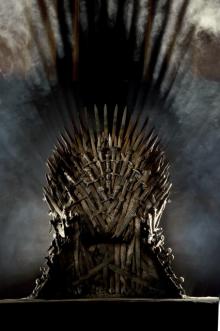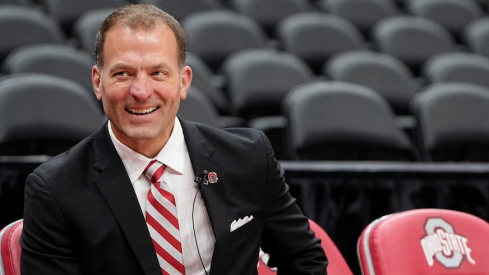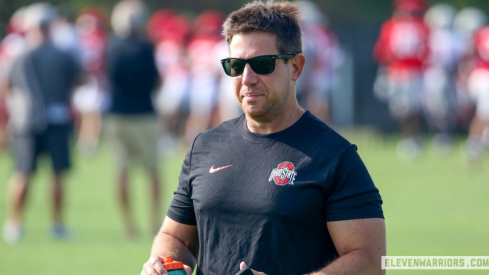 Jim Tressel's new office chair really chafes. . .
Jim Tressel's new office chair really chafes. . .Men line up on the field of battle, in the prime of life, set to fight for fame and glory in the name of their house. Meanwhile, hidden behind veils of law and money, the powers behind the throne send their corrupting tendrils into every nook in search of an edge in competition. The generals, ostensible leaders in this game, as often pawns as kings, are tossed aside as soon as they become a liability; another victim of the drive for victory.
As I watched "A Game of Thrones" this Sunday, I was struck by the similarities between the medieval epic and the modern football fields of today. While one is fiction and the other sport, what amazed me was the extent that each represented the methods that societies used to channel the native agression of the human species. There is something inate to the human animal that compels us to organize into clans, cheering on our proxies to victory. As author Edward Abbey said:
The function of football, soccer, basketball and other passion-sports in modern industrial society is the transference of boredom, frustration, anger and rage into socially acceptable forms of combat. A temporary subsitute for war; for nationalism; identification with something bigger than the self.
The other, darker side of the coin is that in any competitive endeavor in which human pride and ego is at stake, there inevitably follows corruption.
The overriding theme of this offseason has undoubtedly been that of the corrupt patriarch. Jim Tressel provided the most visible example, though the extent to which his infractions indicate corruption is highly debatable. Yet we've also heard rumors of booster payoffs at Oregon and Auburn, and we know that Cam Newton's father solicited cash from at least one school. Criticism of the coaches that roam the sidelines can often reach states of euphoric hyperbole, while supporters close both minds and ranks in an attempt to beat back the tide. As often as not, truth is the casualty while we on the sidelines sit in not-so-blissful ignorance. I have little doubt that the majority of abuse and accusations leveled against Joe Coach at State U are entirely spurious.
That said, I think it's a mistake to worry too much about the feelings of those involved. These are men who, by and large, knew what they were agreeing to when they picked up the clipboard. If you haven't developed a thick skin by age-30, coaching is not the profession for you. However, for all the unearned invective tossed their way, some coaches really are scummy. It is the nature of the job that coaches must balance the necessity of victory with the expectation of honesty. Heavy is the head that wears the crown. Like any head of state, the head coach bears ultimate responsibility.
Football is conflict. I think the late, great George Carlin best illustrates this relationship in this classic routine:
In football the object is for the quarterback, also known as the field general, to be on target with his aerial assault, riddling the defense by hitting his receivers with deadly accuracy in spite of the blitz, even if he has to use shotgun. With short bullet passes and long bombs, he marches his troops into enemy territory, balancing this aerial assault with a sustained ground attack that punches holes in the forward wall of the enemy's defensive line.
I think part of the appeal of football, for me at least, is this allegorical conflict put in the context of a larger drama. Like a great HBO series, football is pure Id, suffused with gray tendrils of moral ambiguity. As fans, we know nothing is as it seems, but not exactly how or why. Sitting as we are in the middle of the offseason, the external drama rises to the surface, unimpeded by the weight of the games themselves. For now, the fans and media are distracted by the Spring practices and NFL draft. For the head coaches of college football, this is their vacation. As interesting as it is to speculate on starting quarterbacks and offensive line depth issues, I'm almost ashamed to admit I'm looking forward to watching College Football's off-the-field conflicts just as much.

